Probing Duterte’s Foreign Policy in the New Regional Order
CenPEG.org
March 13, 2018
Probing Duterte’s Foreign Policy in the New Regional Order: ASEAN, China, and the US appraises the Philippine president’s foreign policy in the first one-and-a-half years of the presidency. CenPEG’s 15th book is also timely amid the new regional order in Asia as well as the tectonic shifts in global politics today.
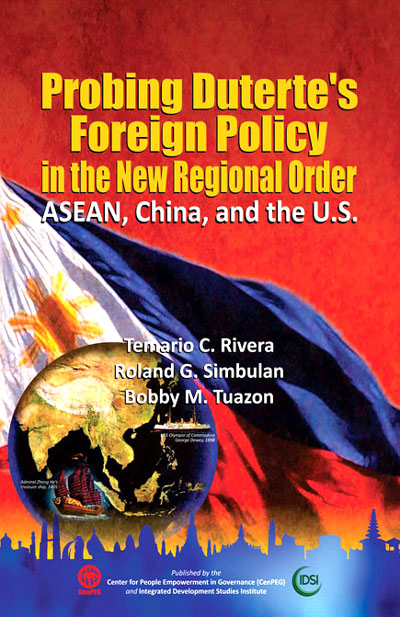
Probing Duterte’s Foreign Policy (250 pages) is written by three CenPEG Fellows, Temario C. Rivera, who is also Board chair; Roland G. Simbulan, Board vice-chair; and Bobby M. Tuazon, CenPEG’s director for policy studies. The three are also teaching in the University of the Philippines (UP). Hosted by the Diliman Book Club, the book was launched on March 10, 2018 at the University Hotel, UP Diliman campus and had the three authors leading the book talk.
Among those who graced the occasion was former UP President Francisco Nemenzo, Jr.; visiting Prof. Sonny San Juan and Prof. Delia Aguilar, former UP Vice President and CenPEG Fellow Amante SV Maragtas, Prof. Roger Mangahas, former UP Manila Arts and Sciences College Dean Fatima Castillo, as well as representatives from the embassies of Japan, Indonesia, and Singapore, government agencies, and foreign and local press. IDSI’s Austin Ong acted as the moderator.
Rivera’s paper (Chapter 1), “The ASEAN, China, and the United States: Challenges to Regional Order,” looks into the conceptual and practical implications of ASEAN’S continuing claim to “centrality” in helping define the region’s security architecture. A crucial test of ASEAN’s centrality, Rivera’s paper says, lies in its ability to adopt a binding Code of Conduct on the SCS. Furthermore, two policy guidelines may be considered by ASEAN and China in addressing the SCS dispute: bilateral talks as a negotiating stance along with a multilateral approach; and, joint exploration and development approaches to the common resources in the contested SCS areas. These are political initiatives to help break the impasse on negotiations on the disputed claims in the SCS.
Tuazon’s paper (Chapter 2), “Duterte’s ‘Pivot to China’: Independent Foreign Policy?”, analyzes the unfolding new level of relationship between the Philippines and China under the watch of Duterte in its major ramifications like trade, investments, and other economic ties as well as military and security concerns including the drug war. Philippine-China relations is scrutinized - at least in the first phase of the Duterte presidency – informed by the president’s foreign policy mindset, the dynamics of the foreign policy bureaucracy and the various stakeholder interests including former foreign affairs officials, as well as the security establishment (defense department and the AFP), and other players such as the Left movement. The paper’s contextual analysis covers China’s economic and security interests in the region, Philippine-US relations under the Trump presidency, as well as the region (Association of Southeast Asian Nations or ASEAN) and Asia Pacific as a whole. Citing in-depth interviews with various international studies experts in the Philippines, China, and the US, his paper seeks to provide a perspective for evaluating Duterte’s independent foreign policy and to serve as a lens in looking ahead at this policy for the remainder of his term.
Simbulan’s paper (Chapter 2), “Philippine-US Security Relations and the West Philippine Sea,” on the other hand, contends that Philippine decision-making on the South China Sea issue and the direction of Philippine-China relations will be defined by contentious struggle among various stakeholders and institutions in Philippine society that “form a pluralistic debate on the determination of both domestic and foreign policy.” Many of these institutions and stakeholders, his paper says, continue to be beholden to the US. Some of these institutions and stakeholders such as big business trace their roots even before the American colonial era.
Chapter 4 is Tuazon’s other paper, “Evolving Security Architectures in Asia: Cooperation or Competition? Implications on the ASEAN.” The paper deals on the current security objectives and undertones of the U.S., Japan, and China in Asia with far-reaching implications on the Philippines and other ASEAN countries. Although written in November 2015 predating Donald Trump’s repudiation of the Trans-Pacific Partnership (TPP), the Philippine government’s decision to join the Asian Infrastructure Investment Bank (AIIB), and the July 2016 award issued by the Permanent Court of Arbitration (PCA) concerning the maritime rifts in the South China Sea (SCS), “Evolving Security Architectures in Asia” provides a valuable contextual tapestry on the historical, economic, and geopolitical roots of current security concerns in Southeast Asia and the emerging roles of the U.S., Japan, and China in this area.
The CenPEG study was made in cooperation with the Jinan University’s Institute of Philippine Studies / Center for Southeast Asian Studies, School of International Relations in Guangzhou, China. The study’s publication has been made possible in cooperation with the Integrated Development Studies Institute (IDSI) headed by George T. Siy.
Copies of the book are available from CenPEG (email: cenpeg.info@gmail.com CC info@cenpeg.org) as well Solidaridad Bookshop (Padre Faura St., Manila), and other outlets.
Following are excerpts from the book:
In addressing the SCS dispute, the ASEAN and China may consider some broad policy guidelines distilled from the ongoing negotiations and related policy debates. Ideally, the problem should be approached via a multilateral framework consistent with ASEAN norms and policy-making procedures. However, a bilateral approach to addressing the problem is not necessarily inconsistent with the long term goal of a multilateral solution. Temario C. Rivera, The ASEAN, China and the United States: Challenges to Regional Order In China, although the field of complex foreign policy has involved a dynamic and omnidirectional interaction ultimately all CPC organs, government agencies and PLA departments as well as think tanks, universities, state-owned enterprises (SOEs), media organizations, and China’s 700 million netizens – have to defer to the CPC leadership. Bobby M. Tuazon, Duterte’s “Pivot to China”: Independent Foreign Policy?
The unity of enlightened leaders, diplomats, legislators, academics, the military establishment, business sector, and other sectors, in support of initiatives to enforce 1987 Constitution, is essential for the emergence of an independent foreign and security policy as a powerful instrument of an independent people. Roland G. Simbulan, Philippine-U.S. Security Relations and the West Philippine Sea
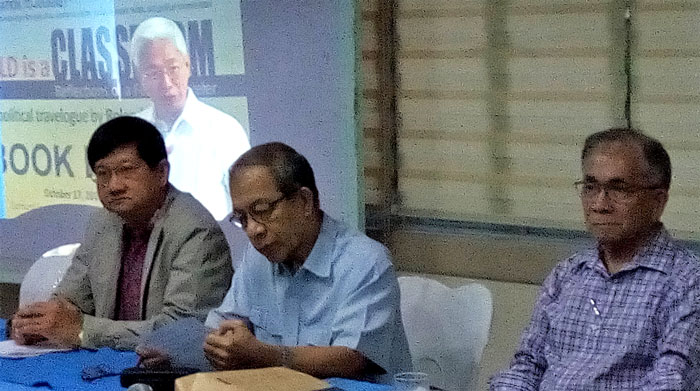
The authors (l-r): Profs. Roland G. Simbulan, Temario C. Rivera, and Bobby M. Tuazon
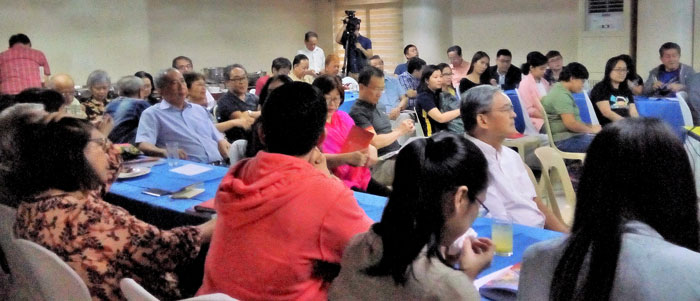
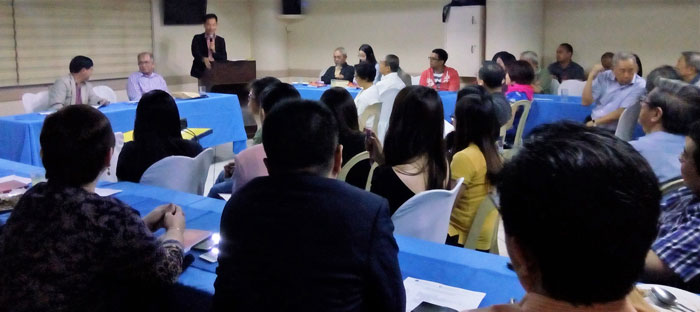
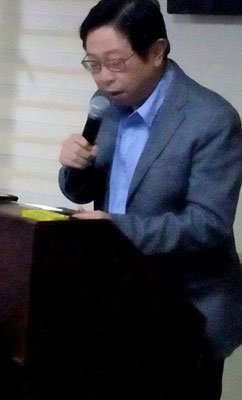
Remarks from George T. Siy of IDSI, co-publisher
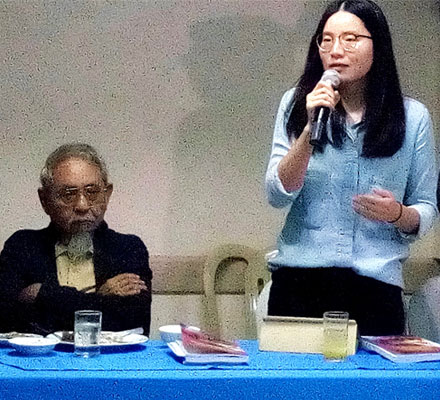
UP political science Prof. Meiting Li during book talk forum. Left is former UP President Francisco Nemenzo, Jr.
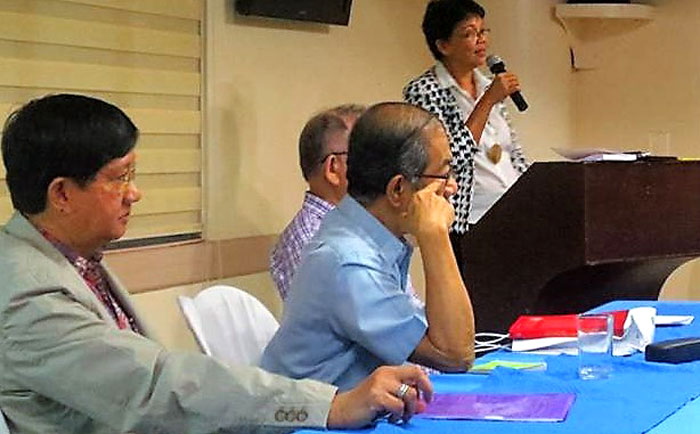
CenPEG Executive Director Evi L. Jimenez
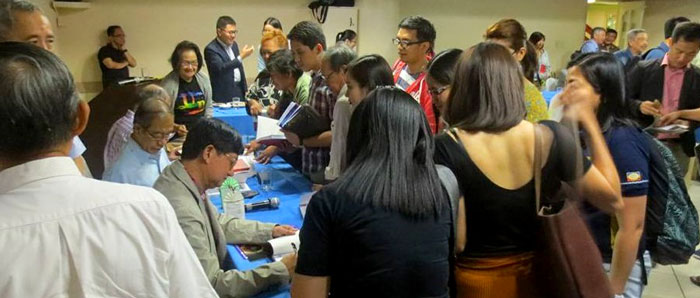
Book signing
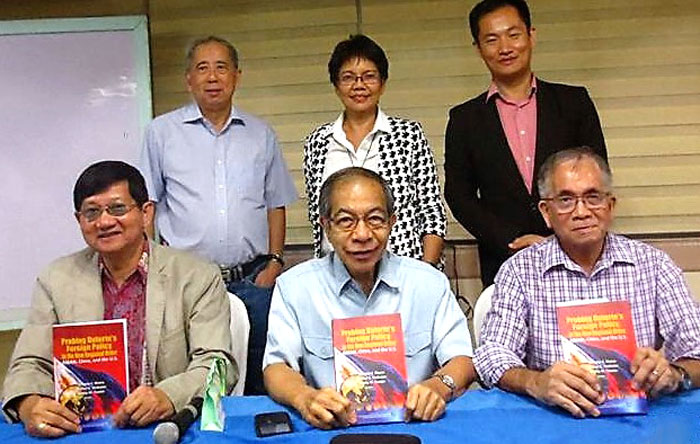
The authors, behind them: Diliman Book Club’s Henson Laurel, CenPEG Executive Director Evi L. Jimenez, and IDSI’s Austin Ong who acted as book talk moderator
- Smartmatic and the Venezuela Electoral Fraud
- Venezuela's Maduro Accuses Smartmatic of Caving to US Pressure
- What could have been done
- SUMMER IN BIKOL FIELDS Learning governance at ground level
- Prospects and Intricacies of a Peace Agreement in the GPH-NDFP Negotiations
- THE CIA IN THE PHILIPPINES: A BRIEF HISTORY
- Military intransigence in the peace talks
- Slim chance of deal in peace talks
- Revisiting Istanbul Principles and its Relevance to Philippine CSOs
- Paving the Way for Philippine CSO Development Effectiveness Work
- THINK TANKS PRESS FOR BILATERAL CEASEFIRE AGREEMENT
- Now more than ever, resume the peace talks!
- The judicious spending of taxpayers’ money: Does it matter?
- ‘Narco politics’ cannot be invoked to replace the people’s right to vote
- Probing presidential platforms
Center for People Empowewrment in Governance (CenPEG), Philippines. All rights reserved


